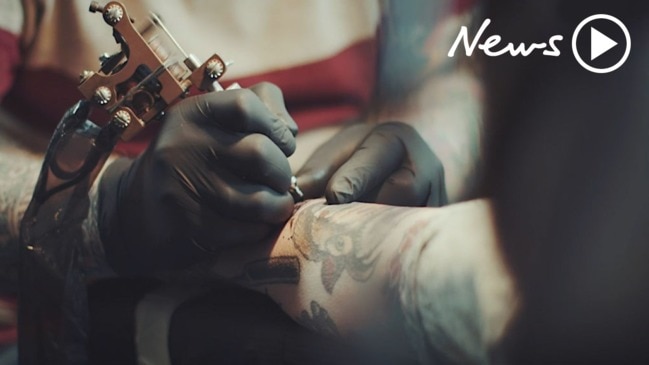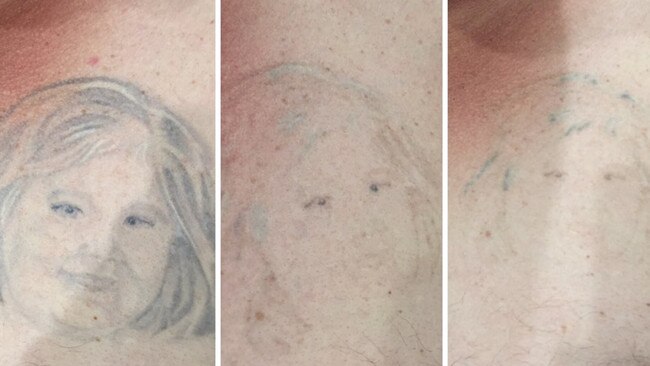Kylie Lang: Why would anyone get a tattoo?
Why on earth do people vandalise their skin under the guise of self-expression, asks Kylie Lang. Tattoos are not art — they’re just a signal of low self esteem and bad job prospects. Stop pretending they’re cool.

Rendezview
Don't miss out on the headlines from Rendezview. Followed categories will be added to My News.
Spring heralds the baring of more skin, however, that skin is unlikely to be bare at all, with inked bodies increasingly the norm.
Necks, faces, limbs and other parts we’d rather not see are being tattooed under the guise of art or self-expression, but I can’t understand why people bother debasing perfectly good skin.
Look away if you don’t like it, some might say, but it’s a bit hard when people are green, red, and every shade of black and blue.
RELATED: What do you when you fall out of love with your tattoo
I have to wonder what is going on in their heads when they think permanent markers are a good idea.
There are even tattoo parties, I’m told, where enthusiasts get together over too much booze and stick ink-dipped needles into each other. Talk about morning-after regret.
And never mind the health risks associated with unhygienic practices, including contracting HIV, as happened to one young guy I know of when he got inked on a whim in Bali.

New research confirms that people who get tatts are impulsive and reckless.
They don’t consider the long-term consequences of their actions, putting their health, finances and social life at risk.
Canadian economists have surveyed more than 1000 people to learn why tattoos are on the rise despite negative career outcomes.
It’s a fair premise.
“A mere two generations ago, tattoos were largely reserved for criminals, sailors and circus freaks,” according to Bradley Ruffle from McMaster University and Anne Wilson from Wilfrid Laurier University.
They’re right, but now it seems as if having tatts is a rite of passage if you’re a bartender, footballer or celebrity.
And stars such as Angelina Jolie and Scarlett Johansson are being blamed for the sharp rise in young women getting inked.

Tapping the trend, the manufacturer of Nivea is about to launch its first new brand in more than 30 years — a Skin Stories range of creams designed to stop tattooed skin cracking and flaking.
All this aside, prevalence doesn’t necessarily denote acceptance.
The Canadian researchers have identified employer bias against tattooed people in occupations in which “patience and planning skills are valued”, including white-collar jobs such as doctors and lawyers.
Through a series of tests they’ve also discovered that people’s financial, physical and emotional wellbeing are detrimentally impacted by the getting of ink (as opposed to wisdom).
MORE FROM KYLIE LANG: Queensland gallery is no place for this kind of ‘art’
In contrast, the non-inked are more inclined to save for retirement, make fewer late credit-card payments, and better manage their debt and finances.
They also drink and smoked significantly less and are far less likely to post “personal or controversial statements online”.
If that’s not enough to turn you off tatts — and annoy those with them — other studies point to low self-esteem.
When Liverpool Hope University’s Marie Randle and Sue Aitken asked people why they got tattoos, the four main motivators were rebellion, aesthetic appearance, personal or emotional significance, and group affiliation.
Common to all of these reasons was low self-esteem, and significantly so for people with at least three tatts.
Makes you wonder how we got to this point, doesn’t it?

According to McCrindle Research, one in five Australians now has one or more tattoos.
For females, the rate is even higher, with celebrity worship a factor.
But it’s not only the very young who are staining their skin — more than one-third of people get their first tatt over the age of 26.
Social researcher Mark McCrindle attributes the sharp rise to the loss of important “life-markers”. How ironic.
“Many life-markers have disappeared from Australians’ lives, from christenings, first Communions and marriages, to first pay cheques and moving out of home,” Mr McCrindle says.
“This has created a yearning to symbolise the chapters of life … and tattoos are part of the new symbolism.”
RELATED: Is removing your tattoo deleting your history?
He says the biggest growth in tattoo design is in the phrase or word category, which has seen a massive increase in the past few years.
A woman I know of has “forever me” inked on her wrist (just in case she forgets who she is).
Another has “Daddy’s little girl” (which seems a bit creepy when you’re a grown woman with a husband and kids).
I get that people might be lacking a metaphorical anchor, what with the demise of church and state, but surely there are better ways to celebrate, commiserate or remember important occasions.

It’s not at all surprising to me that almost one-third of people regret getting a tattoo, according to McCrindle, and it explains why laser removal joints seem to be popping up on every second corner.
Wouldn’t it be smarter — and less painful and costly — to avoid getting inked in the
first place?
Kylie Lang is an associate editor for The Courier-Mail.
kylie.lang@news.com.au


